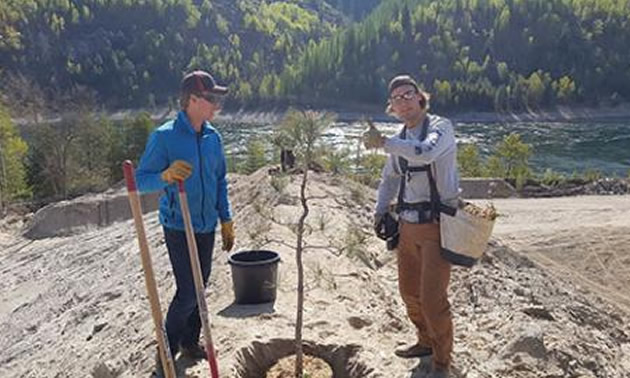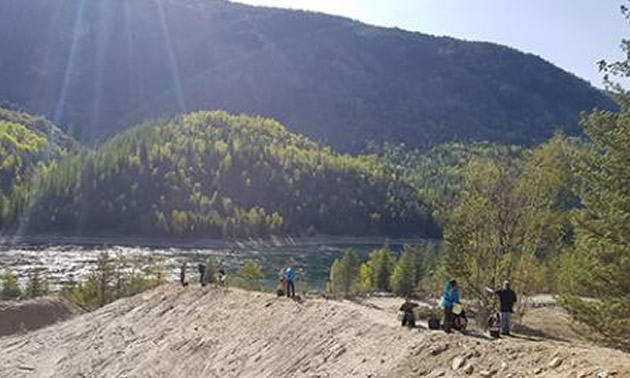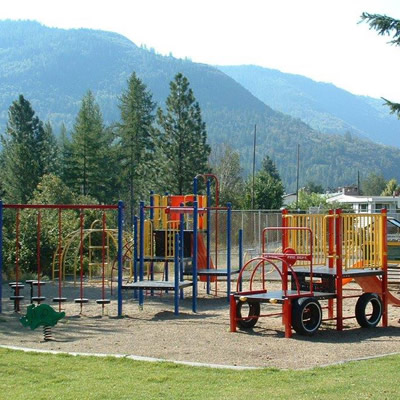Selkirk College students participate in community-based restoration
Students created a three-dimensional model of the project area, then applied an experimental bank stabilization prototype

Students in the Selkirk College Integrated Environmental Planning and Forestry Programs restore reptile habitat at the Silver City Trap Club. — Photo courtesy Selkirk College
Students in the School of Environment & Geomatics wrapped up their first year of study at Selkirk College taking part in a rewarding field school along the banks of the Columbia River just north of Trail.
A group of 50 Selkirk College students in both the Integrated Environmental Planning (IEP) Program and Forest Technology Program spent two days restoring habitat on the banks of the Columbia River for the Silver City Trap Club.
Just after completing the first year of their two-year diplomas, students and their instructors participated in an innovative project to help restore vegetation following re-contouring of the shooting ranges just north of Trail.
As part of the requirements of their spring field school, students in the IEP program first created a three-dimensional model with the Selkirk College Geospatial Research Center stitching together photos from a drone. Then they applied an experimental bank stabilization prototype.
“This was an incredible opportunity for our students,” says Doris Hausleitner, the Selkirk College instructor who teaches the IEP restoration field school. “The trap club provided a great situation where we could teach and apply some of these new technologies”.
For forestry students, it was the first time they had applied silviculture to a restoration project.
“The objectives of field school are to apply concepts covered in the curriculum to real- world situations,” says Carol Andrews, the Selkirk College instructor who teaches the forestry field school. “When they dovetail with community projects, the students and instructors get so much more out of the projects.”

Students worked with members of the Silver City Trap Club during field school along the banks of the Columbia River. — Photo courtesy Selkirk College
Vital Community Partnership Cemented
The Silver City Trap Club, located midway between Castlegar and Trail, recently reconstructed their shooting ranges, resulting in soil and vegetation disturbance. Members of the club took it upon themselves to enhance the area for reptiles, in particular two species at risk, the Western skink and the rubber boa, creating areas where they can overwinter, find cover and bask. Additionally they are making an effort to stabilize steep slopes and revegetate some of the disturbed areas.
“It was a challenging project and the club members were blown away with how diligently all the students worked,” says club member Bill Chapman. “The students planned and implemented the restoration in a safe and controlled way. Absolutely fantastic.”
The experience for instructors and students at Selkirk College was meshed well with the knowledge and skills being built in programs. Efforts will be made to continue a long-term relationship and on-going restoration initiatives with the club. Restoration efforts were supported by Linda Worley from the Kootenay Boundary Regional District, the Columbia Basin Trust Environmental Initiatives Grant, Kalesnikoff Lumber Co., Vaagen Fibre Canada, and Brent Ziegler from Ministry of Forests, Lands, Natural Resource Operations & Rural Development.
Applied studies are a vital part of the Selkirk College programs that prepare students for career-oriented professional opportunities in forestry, land use planning, environmental management and environmental technology.
Learn more about the Selkirk College School of Environment & Geomatics and join us on Facebook.





Comments